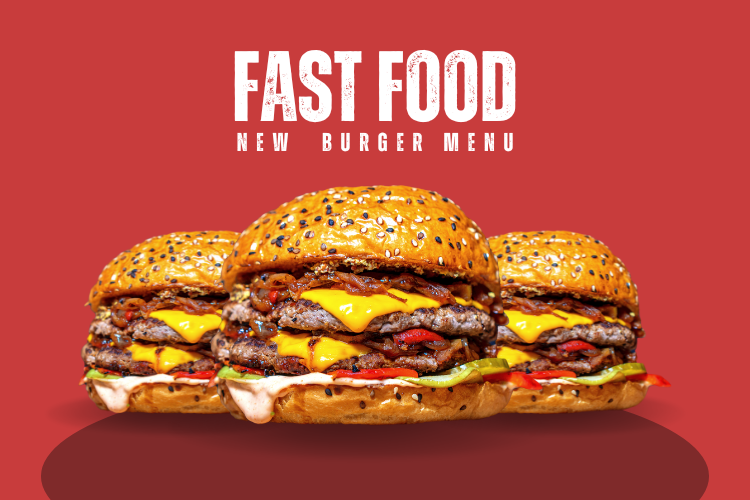Introduction: Impact of Fast Food on Health
In recent decades, fast food has become a mainstay in many people’s diets around the world. Its convenience and low cost make it an appealing choice for individuals who lead busy lives. However, the consumption of fast food has serious health consequences. This article investigates the influence of fast food on health, including information about how it affects the body, the hazards associated with regular consumption, and practical strategies to counteract these effects.
Table of Contents
The Rise of Fast-Food Culture
Fast food culture has grown at an exponential rate since the mid-twentieth century. The fast-food sector has transformed the way we eat, with worldwide giants such as McDonald’s, Burger King, and KFC. Factors leading to this surge are:
- Convenience: Fast food is convenient and quick to prepare, making it great for those with hectic schedules.
- Affordability: Fast food appeals to cost-conscious consumers since it is frequently less expensive than healthy options.
- Aggressive Marketing: Fast food restaurants make significant investments in advertising, targeting both adults and children.
Nutritional Profile of Fast Food
Understanding the nutritional content of fast food is vital in determining its impact on health. Fast food is usually defined by:
- High Caloric Content: Fast food items are frequently high in calories, which contributes to excessive caloric consumption.
- Excessive Fats and Sugars: Many fast-food products are heavy in saturated fats, trans fats, and sugar.
- Low Nutrient Density: Fast food generally lacks critical elements such as vitamins, minerals, and fiber.
Immediate Effects of Fast-Food Consumption
The immediate consequences of eating fast food are sometimes overlooked, although playing an important role in overall health. Some of the short-term consequences are:
- Energy Spikes and Crashes: The high sugar content can cause quick rises in blood sugar levels followed by abrupt drops, resulting in weariness and irritation.
- Digestive Discomfort: Fast food is often poor in fiber, which can cause constipation and bloating.
- Increased Thirst: The high salt level may cause dehydration and an increased demand for fluids.

Long-Term Health Consequences
Regular fast-food eating can cause a variety of chronic health problems. The most serious long-term health consequences are:
- Obesity: Fast food’s high calorie content adds to weight gain and obesity, which are key risk factors for a variety of diseases.
- Heart Disease: Fast food contains saturated and trans fats, which can cause heart disease by increasing bad cholesterol (LDL) and decreasing good cholesterol (HDL).
- Type 2 Diabetes: The high sugar content in fast food increases the risk of insulin resistance and type 2 diabetes.
- Hypertension: Excess salt from fast food can cause high blood pressure, increasing the risk of a stroke or heart attack.
- Liver Damage: High-fat diets can cause fatty liver disease, which can escalate to liver damage with time.
Psychological Impact of Fast Food
Beyond physical health, fast food can have a negative impact on mental health. The psychological effects include:
- Mood Disorders: Diets high in fats and sugars are linked to an increased risk of depression and anxiety.
- Addiction: Fast food’s addictive nature, due to its high sugar and fat content, can result in poor eating habits and food addiction.
- Reduced Cognitive Function: Poor nutrition from fast food consumption can impair cognitive function and memory, particularly in children and adolescents.
Environmental and Social Impacts
Fast food has an impact on the environment and society as a whole, in addition to human health:
- Environmental Degradation: Fast food production is linked to deforestation, excessive water consumption, and greenhouse gas emissions.
- Social Inequities: Fast food is frequently more available in low-income neighborhoods, adding to health inequities between socioeconomic groups.

Mitigating the Impact of Fast Food on Health
While the harmful effects of fast food are well-documented, individuals and society can take meaningful efforts to prevent these impacts:
- Education and Awareness: Raising public awareness of the health problems linked with fast food is critical.
- Healthy Alternatives: Encouraging the consumption of healthier, whole foods can help reduce dependency on fast food.
- Policy Changes: Policies that restrict the nutritional content of fast food and encourage better eating can have a big impact.
- Portion Control: Opting for smaller portions and avoiding super-sized meals can help manage caloric intake.
- Home Cooking: Preparing meals at home gives you more control over ingredients and portion levels, which promotes healthy eating habits.
Conclusion
Fast food has a deep and diverse impact on health, influencing physical, emotional, and societal well-being. While fast food is convenient and inexpensive, its health consequences are significant. Individuals who understand these dangers and take proactive actions to make healthier choices can dramatically enhance their overall health and quality of life.
FAQs
1. Is it alright to consume fast food on occasion?
Yes, eating fast food occasionally is generally acceptable, but it should not be a regular part of your diet. Moderation is key to keeping a healthy lifestyle.
2. What are some better options to fast food?
Healthier options include home-cooked meals, salads, integral grains, lean proteins, and natural fruits and vegetables. Several restaurants also offer healthy menu choices
3. Is it possible to eat fast food in a balanced diet?
Fast food can be included in a balanced diet, but it’s crucial to choose it carefully. For example, choose things with less calories, fats, and sweets, and balance them with meals high in nutrients.
4. How can I lower the influence of fast food on my condition?
Smaller quantities, healthier menu selections, fewer fast-food visits, and an overall balanced diet high in whole foods can all help lessen the effects.
5. What are the indications that fast food is touching my health?
Indications contain weight gain, digestive issues, common weary, increased thirst, and changes in mood or mental function. If you have these indications, it might be time to review your diet.
In conclusion, while fast food is convenient and often tasty, its impact on health cannot be ignored. By making informed choices and fostering healthier eating habits, we can enjoy the benefits of fast food without compromising our well-being.


2 thoughts on “The Impact of Fast Food on Health”